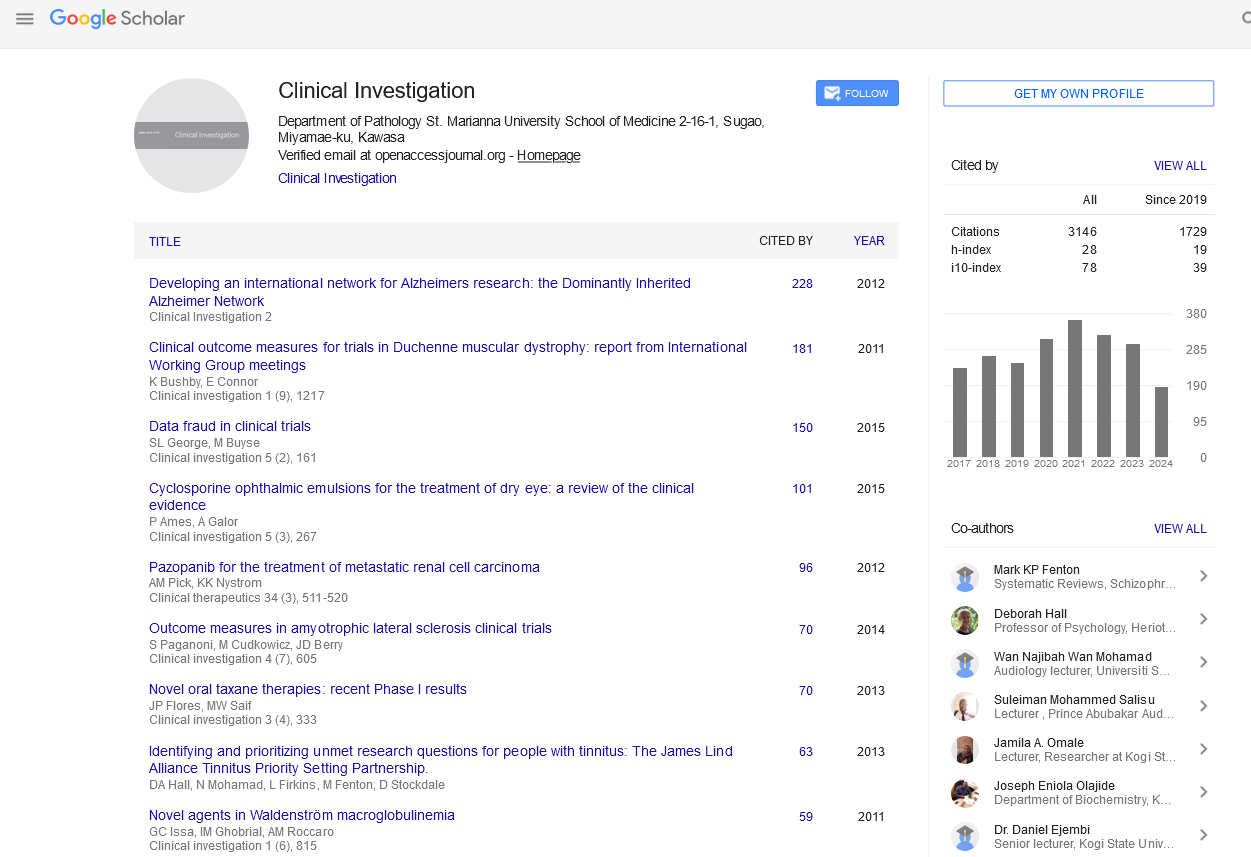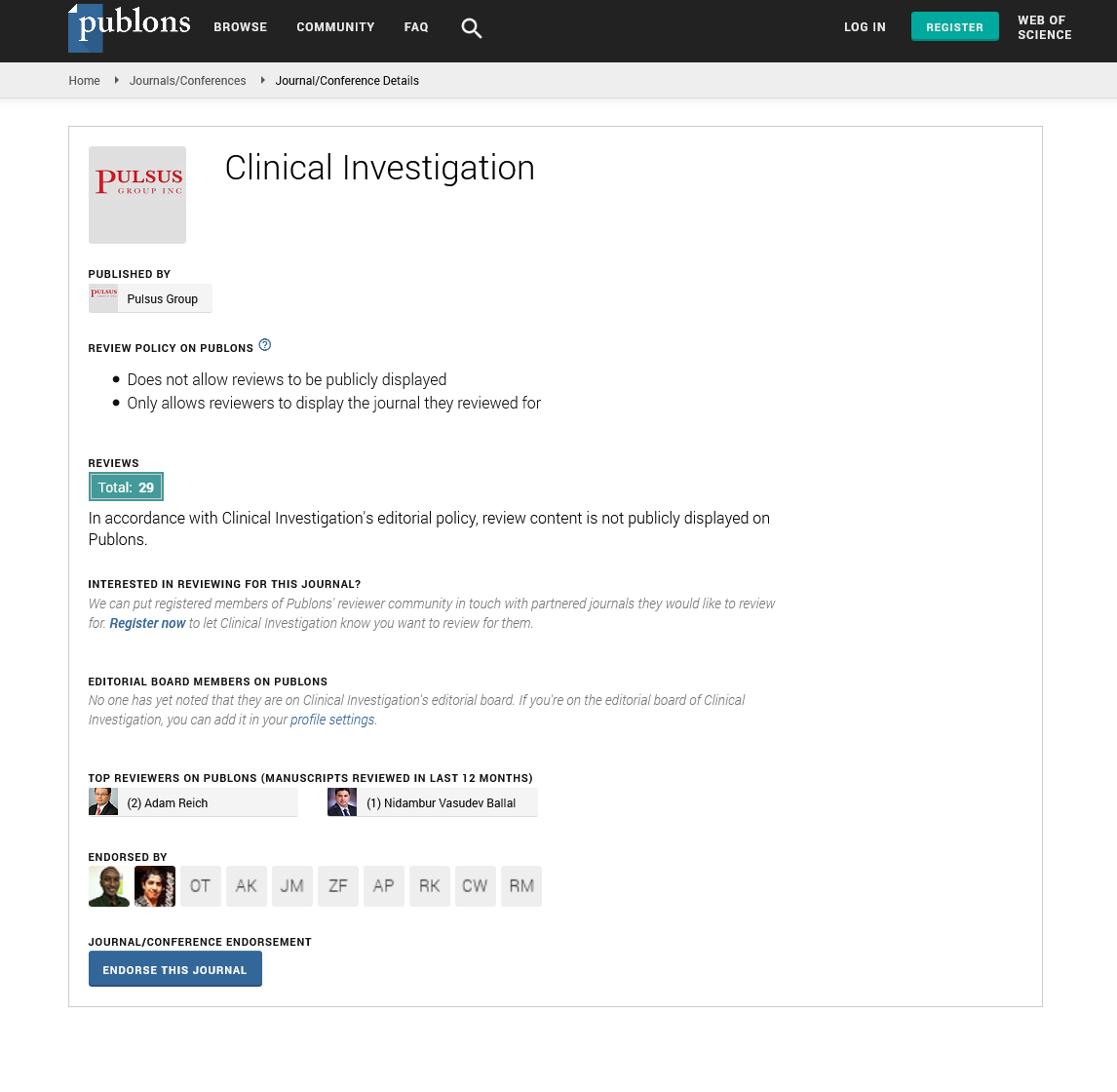Perspective - Clinical Investigation (2024) Volume 14, Issue 1
The Role of Clinical Trials in Advancing Medical Research and Treatment
- Corresponding Author:
- Eiyas Qura
Nanjing University, Faculty of Biology, China
E-mail: eiyasqura@gmail.com
Received: 4-Jan-2024, Manuscript No. fmci-24-159155; Editor assigned: 6-Jan-2024, PreQC No. fmci- 24-159155(PQ); Reviewed: 12-Jan-2024, QC No. fmci-24-159155(Q); Revised: 19-Jan-2024, Manuscript No. fmci-24-159155(R); Published: 25-Jan-2024
Abstract
Clinical trials are an essential component of the medical research process, helping to evaluate the safety, efficacy, and potential benefits of new treatments. These trials are the final step in a rigorous process of testing new drugs, medical devices, or therapies before they are approved for public use. This article explores the importance of clinical trials in advancing medical knowledge, their phases, ethical considerations, challenges, and the future of clinical trial designs in improving patient care and treatment outcomes.
Keywords
Clinical trials • Medical research • Drug development • Treatment efficacy • Patient safety • Medical ethics • Trial design • Clinical trial phases
Introduction
Clinical trials are structured research studies conducted to evaluate the safety, efficacy, an d si de effects of new treatments, drugs, medical devices, or therapies in humans. These trials are critical for the advancement of medical knowledge, as they provide evidence-based results that guide healthcare practices, regulatory approvals, and patient care. Before a new drug or treatment can be approved by regulatory bodies such as the U.S. Food and Drug Administration (FDA) or the European Medicines Agency (EMA), it must undergo a series of clinical trials to ensure its effectiveness and safety.
The clinical trial process is complex, involving multiple phases, each designed to answer specific questions about the treatment. The findings from these trials can have significant implications for public health, as they may introduce more effective therapies, provide alternatives to existing treatments, or even prevent serious side effects and health risks.
This article delves into the role of clinical trials in medical research, the phases involved, the ethical considerations that must be taken into account, and the challenges faced by researchers and participants. It also explores the future of clinical trials and the potential for new designs and technologies to improve outcomes and make trials more efficient.
Phases of clinical trials
Clinical trials are typically divided into four main phases, each serving a unique purpose in the research process:
Phase I: The first stage of testing involves a small group of healthy volunteers or patients. The goal is to assess the safety of the treatment, determine the optimal dosage, and identify any potential side effects. Phase I trials are crucial in establishing the safety profile of a new drug or therapy.
Phase II: Once the treatment has been deemed safe, it moves to Phase II, where it is tested in a larger group of patients who have the condition the drug is intended to treat. This phase aims to evaluate the efficacy of the treatment and further monitor its safety. Researchers may also begin to determine the best way to administer the treatment.
Phase III: Phase III trials involve even larger groups of patients and are designed to confirm the treatment's efficacy, monitor side effects, and compare it to existing standard treatments. These trials provide the most comprehensive evidence and are typically the final step before a drug or treatment is submitted for regulatory approval.
Phase IV: These are post-market surveillance trials that occur after a treatment has been approved and is available to the public. Phase IV trials continue to monitor the drug's long-term effects, including rare side effects that may not have been detected in earlier phases. They can also provide information on the treatment's effectiveness in diverse patient populations.
Importance of clinical trials in advancing medicine
of medicine. Through these trials, researchers gain a better understanding of diseases, their progression, and how various treatments can alter the course of illness. Clinical trials not only help identify new drugs and therapies but also provide vital data about the optimal ways to use existing treatments.
For instance, clinical trials have played a crucial role in advancing the treatment of diseases like cancer, HIV/AIDS, diabetes, and heart disease. They have also facilitated the approval of vaccines, such as those for influenza, COVID-19, and other infectious diseases. Without clinical trials, the development of life-saving drugs and treatments would be severely limited.
Furthermore, clinical trials provide opportunities for patients to access new treatments before they become widely available, often as part of expanded access programs. For patients with conditions that have limited treatment options, participating in a clinical trial may offer the possibility of receiving cutting-edge therapies that would otherwise be inaccessible.
Ethical considerations in clinical trials
Ethical concerns are central to the design and execution of clinical trials. The well-being of participants is paramount, and ethical guidelines, such as those outlined in the Declaration of Helsinki, are in place to ensure that trials are conducted safely and with respect for human rights. Key ethical considerations include.
• Informed consent: Participants must be fully informed of the potential risks and benefits of the trial before agreeing to participate. They should also be made aware of their right to withdraw from the trial at any time without penalty.
• Patient safety: Ensuring the safety of trial participants is a top priority. This includes careful monitoring for adverse effects, especially in the early phases of a clinical trial when the risks may be unknown.
• Equity and inclusion: Clinical trials must be designed to include diverse patient populations, ensuring that findings are applicable to different demographics, including age, gender, ethnicity, and underlying health conditions.
• Placebo use: In some trials, placebos are used as a comparison to determine the true effects of a treatment. However, the use of placebos in critical or life-threatening conditions raises ethical questions, as participants may not receive the best available treatment.
Challenges in clinical trials
Despite their importance, clinical trials face several challenges
• Recruitment and retention: Recruiting enough eligible participants for clinical trials can be difficult, especially for rare diseases or conditions with specific eligibility criteria. Furthermore, keeping participants enrolled throughout the trial period can be challenging due to the length of the study or adverse side effects.
• Cost and time: Clinical trials are expensive and time-consuming. The costs associated with conducting trials, including participant recruitment, monitoring, data collection, and analysis, can be substantial. Additionally, the lengthy nature of some trials can delay the approval of new treatments.
• Regulatory hurdles: Navigating the regulatory landscape is often complex and can delay the approval process. Regulatory bodies require extensive data and evidence from clinical trials to ensure that treatments are safe and effective, which can take years to compile.
• Data integrity: Ensuring the accuracy and reliability of clinical trial data is crucial. Any issues related to data manipulation, bias, or incomplete data can compromise the trial’s findings and undermine public trust in the research process.
Conclusion
Clinical trials are the cornerstone of medical research, providing invaluable insights into the safety and efficacy of new treatments. From small-scale Phase I trials to large-scale Phase III trials, each stage of testing plays a crucial role in determining whether a new drug or therapy is viable for public use. While ethical considerations, recruitment challenges, and the high cost of trials remain significant obstacles, advances in trial design, technology, and regulatory processes continue to improve the efficiency and accessibility of clinical research.
The future of clinical trials lies in more personalized and adaptive trial designs that can accelerate the discovery of effective treatments. Additionally, innovations in digital health and remote monitoring may open new opportunities for patient recruitment, engagement, and data collection, making clinical trials more accessible and efficient.
Ultimately, clinical trials will continue to be vital in advancing medical science, improving patient care, and saving lives by providing evidencebased solutions to the world’s most pressing health challenges.


